
Alviva Group, owner of Ukraine’s leading bakery products company Kyivkhlib LLC, harvested 5,419 tons of its first winter wheat and sunflower crop in its pilot season for its agricultural division in 2025, the group’s press service reported on Facebook.
It is recalled that in 2024, it began operations in the Kyiv and Chernihiv regions, where it has 4,000 hectares of agricultural land.
“5,419 tons is the total volume of the first harvest (winter wheat and sunflower). The total area of land that has been restored and recultivated is 1,300 hectares. 204 hectares have been demined and 760 hectares have been cleared of trees to return the land to economic use,” Alviva Group shared its achievements.
Next season, 2025–2026, the company plans to expand its acreage by 26% to 3,510 hectares through demining and recultivation. In addition, Alviva Group’s agricultural division intends to diversify its crop structure and add rye, corn, and rapeseed to its crop rotation.
Alviva Group is an international group of companies in the food technology and services sector. It produces bakery products under the brands Kyivkhlib, Tarta, Tendi, Norden Brod, British Sandwich, Mr Snex, Naturavo, Honey Moon, and Kyivmlyn.
The group exports to 30 countries around the world. Its land bank covers more than 4,000 hectares in the Kyiv and Chernihiv regions.
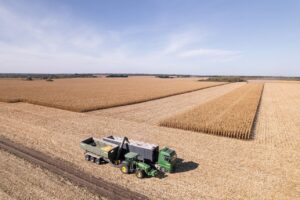
The crop division of the Alebor Group grain trading company has completed the 2025 production season, the company’s press service reported on Facebook.
According to the report, the company’s specialists grew and harvested wheat from 2,000 hectares with a yield of over 7 tons/hectare, corn from 1,100 hectares with a yield of 14.5 tons/hectare, rapeseed from 1,500 hectares with a yield of 3.6 tons per hectare, and sunflower from 1,800 hectares with a yield of 3.85 tons per hectare.
Alebor Group is a trading company founded in 2006 in the Cherkasy region. Its structure includes the Khristinivskoye Grain Receiving Enterprise (with a storage capacity of 74,000 tons of grain), the Voronovitske Grain Receiving Enterprise (104,000 tons of grain), Chesne Grain Receiving Enterprise (27,500 tons of grain), transport companies Boleko and Avtoera with a fleet of 210 heavy-duty grain trucks, and construction company Alebor Real Estate.
According to information on the company’s website, Alebor Group is one of the top 20 grain trading companies in Ukraine, exporting about 2 million tons of grain annually. The group has its own land bank of 6,500 hectares. The company’s founder is Oleksiy Kustov.
KMZ Industries is the largest manufacturer of elevator equipment in Ukraine and produces a full range of products, including silos, grain dryers, transport equipment, and separators, as well as providing automation and installation services.
According to the company, it has built more than 5,000 facilities. KMZ Industries silos with a total volume of more than 12.5 million cubic meters are in operation.
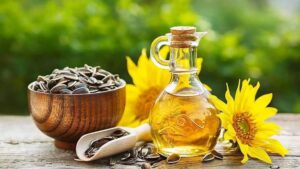
Purchase prices for sunflower seeds in Ukraine have fallen due to the suspension of oil and meal exports as a result of the Russian strike on the oil extraction plant (OEP) in the port of Pivdennyi, according to the Electronic Grain Exchange.
According to the exchange, Ukrainian processors have sharply reduced their purchase prices for sunflower seeds due to damage to the vegetable oil transshipment terminal at the oil extraction plant, the suspension of maritime exports, and the increased risk of attacks on other plants.
“Purchase prices for sunflower seeds yesterday (Monday – IF-U) fell by 1,000-1,300 UAH/t to 27,000-27,500 UAH/t, or $560-570 per ton (excluding VAT) with delivery to the plant,” the exchange said.
Currently, processors have sufficient stocks of sunflower seeds, experts said, but the suspension of maritime exports will force them to reorient exports across the western border, as was the case in 2022, which will increase logistics costs.
As reported, on the night of December 22, the Russian army attacked the port and energy infrastructure of the Odesa region, resulting in containers with flour and oil catching fire. As a result of the attack on December 23 on the port infrastructure of Odesa, a ship flying the Lebanese flag, which was transporting Ukrainian soybeans, was also damaged.
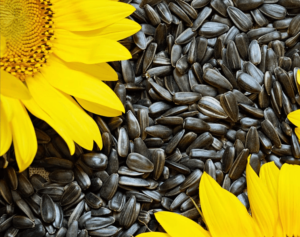
As of December 5, farmers have harvested 53.597 million tons of grain and legumes from 10.55 million hectares, which is 91% of the area sown with these crops, according to the Ministry of Economy, Environment, and Agriculture.
According to the Ministry of Economy, 23.5 million tons of corn have been harvested from 3.44 million hectares. As for wheat, its yield is slightly higher than a year ago – 22.96 million tons from 5.05 million hectares compared to 22.40 million tons from 4.9 million hectares, while barley is slightly lower – 5.42 million tons from 1.36 million hectares compared to last year’s 5.6 million tons from 1.41 million hectares.
This year’s pea harvest is significantly higher – 672,500 tons from 275,100 hectares compared to 469,000 tons from 212,300 hectares a year ago, while buckwheat and millet are still significantly lower – 82.7 thousand tons compared to 131.7 thousand tons and 62.1 thousand tons compared to 161.3 thousand tons, respectively.
The harvest of other cereals and legumes this year reached 899.6 thousand tons from 327.8 thousand hectares as of December 5, compared to 1 million tons a year ago.
The Ministry of Economy has calculated that the corn harvest has been gathered from 78% of the production areas allocated for this crop, millet – from 88%, buckwheat – from 97%, wheat and barley – from 98%.
As for oilseeds, their harvest as of December 5 is 17.11 million tons. In general, sunflower has been harvested from 93% of the sown areas, and soybeans from 97%. The rapeseed harvest has been completed, and it turned out to be only slightly less than last year’s – 3.31 million tons against 3.5 million tons from almost identical areas – about 1.3 million hectares.
Currently, 4.75 million tons of soybeans have been harvested from 2.00 million hectares, while 9.04 million tons of sunflower seeds have been harvested from 4.81 million hectares.
In addition, the harvest of sugar beets is also lagging behind: 98% of the production area has been harvested, yielding 10.39 million tons from 195,000 hectares.
In its October inflation report, the National Bank of Ukraine increased its estimate of the grain and legume harvest in 2025 to 61.5 million tons from 57.9 million tons in the July report, while lowering its estimate of the oilseed harvest to 19.3 million tons from 21.0 million tons.
The NBU recalled that last year, the grain harvest in Ukraine fell to 56.2 million tons from 59.8 million tons in 2023, and oilseeds from 21.7 million tons to 20 million tons.
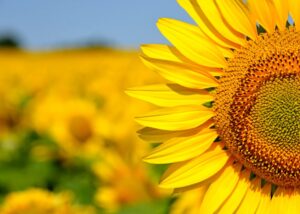
The Ristone Holdings agricultural group is completing the harvest on an area of about 38,000 hectares and is simultaneously finishing sowing winter crops, for which it has allocated 26,800 hectares, the agricultural holding’s press service reported on Facebook.
“Sunflowers were the main crop of this year’s harvest. As planned in the spring, 29,000 hectares were sown with this strategically important and highly profitable crop. As of today, the sunflower harvest from these areas has been completely completed,” the agricultural group stated.
In addition, the holding’s farmers harvested 5.5 thousand hectares of corn and 350 hectares of soybeans, thus completing the 2025 harvesting campaign.
In parallel with the harvest, Ristone Holding farms prepared the soil for the 2026 sowing campaign. The fields were plowed for winter crops, which is a key agronomic measure for moisture accumulation, soil structure improvement, and weed and pest control. The final stage of the autumn work was the sowing of winter crops, which is currently in its final stages.
For the 2026 harvest, the agricultural holding sowed 23,000 hectares with winter wheat and 3,800 hectares with winter rapeseed.
The Ristone Holdings group of companies is a vertically integrated agricultural holding company, which includes: Dnipromlyn LLC, Bakery No. 10 LLC, Orilsky United Elevator LLC, Agrofirma Orilskaya LLC, Agroalliance LLC, Agrofirma Victoria State Enterprise, Agrofirma im. Gorkogo LLC, Zlagoda Agricultural Production Cooperative, etc.
Ristone Holdings cultivates 65,800 hectares in the Dnipropetrovsk, Kharkiv, and Zaporizhzhia regions. It is engaged in the cultivation of grain and industrial crops, animal husbandry, production, and wholesale and retail trade in agricultural products, including flour, bread, bakery products, etc.
The founder and chairman of the supervisory board of Ristone Holdings is Vadym Nesterenko.
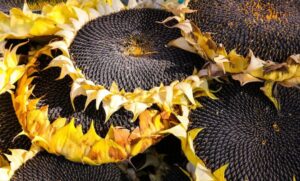
The IMC agricultural holding has completed the sunflower harvest from an area of 24.8 thousand hectares and collected over 81 thousand tons with a record yield of 3.3 t/ha, the agricultural holding’s press service reported on Facebook.
IMK cited data from the Ministry of Economy, Environment, and Agriculture, according to which, as of October 6, 2025, the average sunflower yield in Ukraine was 1.83 tons/ha.
“The sunflower harvest was not easy — the weather this year made its adjustments more than once. We exceeded the planned yield indicators, the average oil content reached a record 54%, and in some fields it reached an incredible 64%,” said IMC Chief Operating Officer Bohdan Kryvitsky.
IMK also completed the sowing of winter wheat for the 2026 harvest on an area of 21,000 hectares, which is 18% of the company’s total land bank.
“This year, due to problems with autopilot systems caused by the operation of electronic warfare equipment, we were forced to return to sowing with physical markers. Despite this, we worked in an organized manner and met the optimal deadlines,” Kryvitsky commented.
IMK Agroholding is an integrated group of companies operating in the Sumy, Poltava, and Chernihiv regions (northern and central Ukraine) in the segments of crop production, elevators, and warehouses. The land bank is 116,000 hectares, storage capacity is 554,000 tons, and the 2024 harvest is 864,000 tons.
IMK ended 2024 with a net profit of $54.54 million, compared to a net loss of $21.03 million in 2023. Revenue grew by 52% to $211.29 million, gross profit quadrupled to $109.10 million, and normalized EBITDA increased 25-fold to $86.11 million.